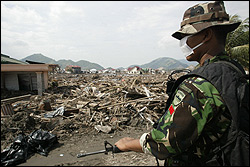The Dec. 26 earthquake and tsunami in South Asia and Africa is a particularly nasty example of how humans can make the ravages of nature less severe, or worse. Levees prevent rivers from flooding, but eroded hillsides create deadly mud slides during tropical hurricanes. In the case of the tsunami, mangrove trees planted years ago for just this purpose served to break the waves in areas of coastal India, minimizing the damage. Elsewhere, the harvesting of coral reefs took away a natural barrier that might have saved countless lives.
But the greatest artificial hazards in this tragedy are not environmental; they are political. Precious days were wasted, particularly by the Bush administration, while the scope of the crisis facing quake and tsunami survivors became clearer. For five successive business days, the White House, vacating in Crawford, Texas, gradually escalated its response, from a pitiful $15 million with no public appearance by Dubya to the weekend’s $350 million with a mass military mobilization. Finally, it seemed, our government Got It.
Or not. Two of the hardest hit areas are also war zones: Sri Lanka, where the rebel Tamil Tigers have control of the northeast part of the island nation, and Sumatra, where guerrillas in Aceh province have been fighting a long war for secession from Indonesia. Another stricken country, Myanmar (formerly Burma), is an international pariah due to a drug-running, thuggish military government.
The news from Sri Lanka has been relatively encouraging; there, rebels and the central government have been working together to coordinate relief efforts. But Indonesia is another story.
For years, Congress has gone back and forth on whether to forbid military aid to Indonesia because of the horrific human-rights record of that country’s military in both East Timor and Aceh. In Aceh, up to 90 percent of the war’s casualties have been civilians, most at the hands of marauding military death squads. Since May 2003, more than 2,000 people have died in Aceh under martial law and a civil emergency. The area was closed to foreigners, and after the quake, the Indonesian government wasted precious days deciding whether to allow foreign relief efforts and media in. Eventually, the government and the guerrilla Free Aceh Movement declared a cease-fire, but there have been reports that the Indonesian military has been using disaster relief as a cover for additional operations attacking guerrillas.
These are the partners that, of necessity, the U.S. government and private relief organizations are forced to work with to get food, water, and desperately needed supplies into regions flattened by both earthquake and sea. Understandably, the average Acehnese might be reluctant to approach the food and water trucks when supplies are being handed out by the same military that might have murdered a cousin. The image of the U.S. military, already unpopular after the Iraq invasion, also suffers: We’re working side by side with the Indonesian government.
Private groups also face these dilemmas, dealing with corporate as well as government entities. Much-praised Portland-based Mercy Corps, for example, lists as “partners” Nike and Microsoft, pioneers in outsourcing low-paying jobs to this part of the world. Beneath it all, there is the danger of official corruption, endemic in Indonesia and many of the other stricken countries. Not a few of the supplies sent in good faith to desperate regions will wind up instead in palaces or on the black market.
To a greater or lesser degree, all of the ravaged countries in Asia and Africa are poor, some desperately so. This, too, is a condition inflicted by humans. The sickest humor of the week was the notion that Jeb Bush had some sort of “expertise” relevant to relief for this disaster because of his experience during Florida’s four hurricanes last year. The U.S., with its wealth and sophistication of emergency preparedness and response, suffers few casualties during natural disasters. Jeb Bush has never seen anything remotely like what awaited him in Indonesia.
The better comparison is Iraq, where, the British journal Lancet estimates, more than 100,000 civilians have died since the U.S. invasion began in March 2003. As criticism of the Bush administration mounted for its relatively slow response to the tsunami, congressional Democrats began calling for funds to be transferred out of the $15 billion already appropriated, and not being spent, for Iraqi reconstruction.
Reconstruction will also be the trickiest phase of this latest disaster. After the media have moved on, will the Indonesian or Sri Lankan governments, for example, use reconstruction aid to play politics with regions that want to secede? And if so, how many more people will suffer or die as a result?
The power of nature is awesome. The power of humans to unnecessarily compound a tragedy is only slightly less so.







